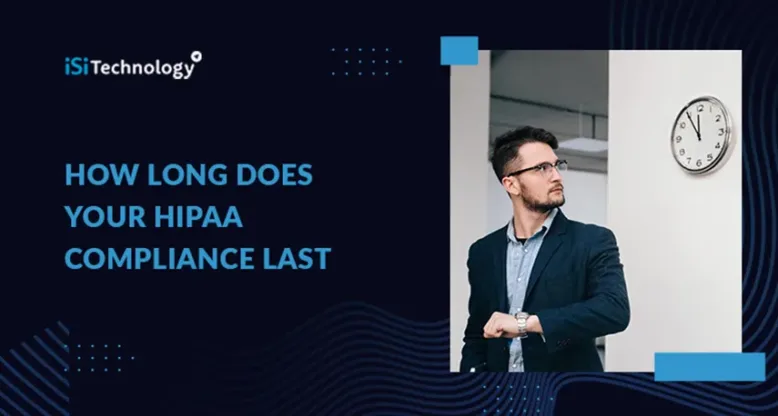How Long Does Your HIPAA Compliance Last

Introduction
Recent data indicates most covered entities end up in direct violation of several elements of HIPAA law. In the end, failure to not comply with HIPAA law can impact entities.
As HIPAA compliance continues to be in the spotlight, it is time for covered entities to review their HIPAA compliance status. When it comes to standard HIPAA rules, health insurance providers often don’t understand updated HIPAA retention requirements.
Let’s look at how long HIPAA compliance can last and what entities need to know about HIPAA record retention requirements.
Understand the Basics of HIPAA Retention Requirements
Whether it’s individuals or health insurance providers, HIPAA data retention requirements are applicable to both parties. In fact, the HIPAA retention guidelines mandate individuals and healthcare providers to maintain various documents for a specific period. When HHS audits an employee or a health insurance provider, it is crucial to produce the required records for inspection.
When it comes to HIPAA data retention, specificity can make all the difference. Here are the documents that tie together with the standard HIPAA data retention law:
- HIPAA-based assessment records
- Documents related to privacy and security processes that showcase HIPAA compliance
- Digital and written records related to either individuals or insurance providers
- Documentation of compliance officers and other individuals responsible for keeping records
- Data usage agreements and similar forms mandated by HIPAA compliance
- Patients’ medical billings records
- Notes of Privacy
- All disclosures involving PHI
Since HIPAA data retention falls on individuals and healthcare insurance providers, it is crucial to determine whether or not you’re HIPAA compliant. Most entities make adjustments to their existing policies every one or two years.
Sure, healthcare insurance providers don’t have to follow HIPAA retention requirements when it comes to medical records. Still, the fact is that the HIPAA data retention regulatory standard highlights the timeframe of policies to maintain all records related to HIPAA compliance.
When it comes to HIPAA data retention standards, make sure you’re aware of the key required documents. The truth is that many documents apply to HIPAA data retention. For the sake of simplicity, you should focus on the essential documents:
- Access logs
- Patient authorizations
- Full-time staff-sanctioned policies
- Disaster recovery plan
- Risk analyses
- Privacy rules
- security rules
- Breach notification records
- complaint records
- resolution records
- Documentation of newly implemented technologies or processes
- Onsite security maintenance documents
Added Considerations

On top of HIPAA data retention guidelines, health insurance providers have to keep up with FINRA compliance requirements. Similarly, employers have to follow the standard practices outlined in the FLSA and ERISA Acts.
In such cases, insurance and healthcare providers may have no choice but to maintain permanent records. Not to mention, CMS requires insurance and healthcare providers to maintain records of the last ten years in the form of cost reports.
In a broad sense, HIPAA indicates that covered entities should retain records for an indefinite period without any time limit. Oftentimes, healthcare providers have to reference State-specific laws to follow through with the “right” HIPAA compliance requirements.
How Long Does HIPAA Compliance Last for an Individual
Like healthcare insurance providers, the HIPAA rules apply to individuals. If you’re wondering how long HIPAA certification is good for individuals, understand that HIPAA compliance gives the same flexibility to individuals as healthcare/insurance providers.
In short, HIPAA highlights covered entities to record executed rules, processes, evaluations, or proactive measures to secure HIPAA compliance. Like healthcare/insurance providers, individuals have to maintain records for at least six years. And these six years can be “from” the time of implementing policy or “after” the creation of the document.
HIPAA Compliance Timeframes

If you’re thinking about how long HIPAA requires records to be kept, know that HIPAA regulations mandate business associates and insurance/healthcare providers to maintain proper medical records for no less than 6 years. If the policy was maintained prior to making any changes, covered entities have to keep original documentation for ten years from the time of its creation.
Now, the timeframe is more flexible when it comes to a single business associate or healthcare location. In the case of a full-time employee, it should take a minimum of 6 months to ensure HIPAA compliance. However, if the staff member cannot take out a couple of hours a week, then it would take more time to ensure HIPAA compliance.
Final Thoughts
Today, data privacy and security have become hot topics. And the value of data takes a new meaning when you’re dealing with sensitive health information. Failure to follow data retention requirements can trigger heavy penalties for insurance and healthcare providers.
It is the main reason data security and privacy rules mandated by HIPAA have become integral for healthcare providers and insurance companies. Remember, covered entities also include third parties that get health information from insurance and healthcare providers.
Try Billing Software Today
Opt for the leading billing team to get the best support and HIPAA compliance service solution. Among the most reliable, secure, transparent, and modern billing solutions – ClaimGenix is leading the charge. You can leverage our HIPAA compliant billing software to take care of your medical billing needs.
With ClaimGenix, you don’t have to deal with administrative issues and focus on providing quality care to patients. Learn more about how our Medicaid billing solution works wonders for covered entities.